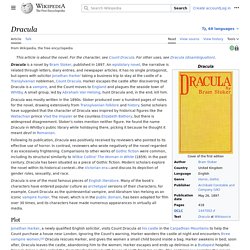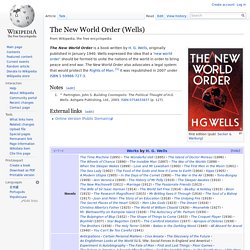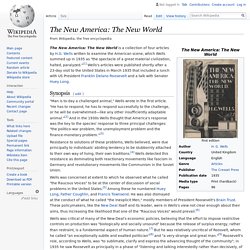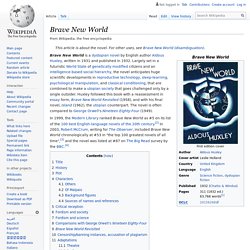

Dracula 1897, Boards the Demeter bound for England. 1897 Gothic horror novel by Irish author Bram Stoker Dracula is an 1897 Gothic horror novel by Irish author Bram Stoker.

It introduced the character of Count Dracula and established many conventions of subsequent vampire fantasy.[1] The novel tells the story of Dracula's attempt to move from Transylvania to England so that he may find new blood and spread the undead curse, and of the battle between Dracula and a small group of people led by Professor Abraham Van Helsing. Dracula has been assigned to many literary genres including vampire literature, horror fiction, gothic fiction, and invasion literature.
The novel has spawned numerous theatrical, film, and television interpretations. Plot Stoker's handwritten notes on the characters in the novel Dracula boards a Russian ship, the Demeter, taking with him boxes of Transylvanian soil, which he requires in order to regain his strength. Harker's fiancée, Mina Murray, is staying with her friend Lucy Westenra, who is holidaying in Whitby. Dracul. The New World Order (Wells) Jump up ^ Partington, John S.

Building Cosmopolis: The Political Thought of H.G. Wells. Ashgate Publishing, Ltd., 2003. ISBN 0754633837 (p. 127). Online Version (Public Domain) The New America: The New World. The New America: The New World is a collection of four articles by H.G.

Wells written to examine the American scene, which Wells summed up in 1935 as "the spectacle of a great material civilization, halted, paralyzed. "[1] Wells's articles were published shortly after a 23-day visit to the United States in March 1935 that included a lunch with US President Franklin Delano Roosevelt and a talk with Senator Huey Long. Synopsis[edit] "Man is to-day a challenged animal," Wells wrote in the first article. Resistance to solutions of these problems, Wells believed, were due principally to individuals' abiding tendency to be stubbornly attached to their own way of living, their own traditions.[4] Wells detected this resistance as dominating both reactionary movements like fascism in Germany and revolutionary movements like Communism in the Soviet Union. H. G. Wells bibliography. H.

G. Wells was a prolific writer of both fiction and non-fiction. His writing career spanned more than sixty years, and his early science fiction novels earned him the title (along with Jules Verne and Hugo Gernsback) of "The Father of Science Fiction".[1] Novels[edit] Wells's works were reprinted in American science fiction magazines as late as the 1950s Non-fiction[edit] Stories[edit] Note: The stories are listed in alphabetical order of title within each year, and not in order of their publication during the year. Story collections[edit] Film stories[edit] Published versions of film scripts and scenarios written by Wells: The King Who Was a King: The Book of a Film (1929 – scenario for a film which was never made)Things to Come (1935 – adaptation of The Shape of Things to Come and The Work, Wealth and Happiness of Mankind)The Man Who Could Work Miracles (1936)The New Faust (in Nash's Pall Magazine, December 1936 – unmade adaptation of "The Story of the Late Mr.
Brave New World. Classic 1932 science fiction novel by Aldous Huxley In 1999, the Modern Library ranked Brave New World as #5 on its list of the 100 best English-language novels of the 20th century.[2] In 2003, Robert McCrum, writing for The Observer, included Brave New World chronologically at #53 in "the top 100 greatest novels of all time",[3] and the novel was listed at #87 on The Big Read survey by the BBC.[4] Title[edit] O wonder!

How many goodly creatures are there here! How beauteous mankind is! Translations of the title often allude to similar expressions used in domestic works of literature: the French edition of the work is entitled Le Meilleur des mondes (The Best of All Worlds), an allusion to an expression used by the philosopher Gottfried Leibniz[7] and satirised in Candide, Ou l'Optimisme by Voltaire (1759).